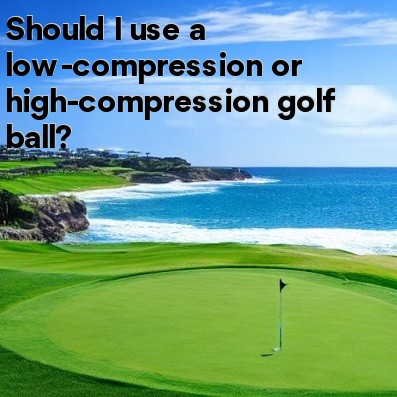
In golf, Should I use a low-compression or high-compression golf ball?
When it comes to choosing the right golf ball for your game, one of the key considerations is compression. Golf balls come in different compression levels, typically ranging from low to high. The compression of a golf ball refers to how tightly the ball is wound and determines the feel and performance characteristics of the ball.
So, the question is, should you use a low-compression or high-compression golf ball? Let's take a closer look at both options to help you make an informed decision.
Low-Compression Golf Balls
Low-compression golf balls are generally recommended for players with slower swing speeds, beginners, and those looking for more distance. These balls have a softer feel and compress more easily upon impact. The lower compression allows for greater energy transfer, resulting in increased distance off the tee.
- Advantages of low-compression golf balls:
- Greater distance: The lower compression allows the ball to compress more upon impact, resulting in increased distance off the tee.
- Softer feel: Low-compression golf balls often have a softer feel off the clubface, providing enhanced feedback and control.
- Slower swing speeds: If you have a slower swing speed, a low-compression ball can help you achieve maximum distance.
High-Compression Golf Balls
High-compression golf balls, on the other hand, are designed for players with faster swing speeds, experienced players, and those looking for more control. These balls are firmer and require more force to compress. The higher compression allows for increased accuracy and better control over shots.
- Advantages of high-compression golf balls:
- Control and accuracy: High-compression golf balls provide better control over shots, making them suitable for experienced players who prefer accuracy over distance.
- Less spin: These balls tend to have lower spin rates, which can reduce slices or hooks and help keep the ball on target.
- Faster swing speeds: If you have a faster swing speed, a high-compression ball can help you maximize control and accuracy.
Ultimately, the decision between low-compression and high-compression golf balls depends on your individual playing style, swing speed, and preferences. It's important to note that there is no one-size-fits-all answer. Some players may find a low-compression ball provides the best combination of distance and feel, while others may prefer the control and accuracy offered by a high-compression ball.
To determine which compression level is right for you, consider factors such as your swing speed, desired distance, accuracy requirements, and personal preference. If possible, it may be beneficial to try out different golf balls with varying compression levels and see how they perform for your game.
In conclusion, whether you should use a low-compression or high-compression golf ball depends on your individual needs and preferences. It's worth experimenting with different balls to find the one that suits your game best. Remember, the right golf ball can make a significant difference in your overall performance on the course.





